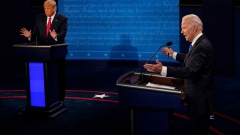Feb 28, 2020
Turkey Disputes Russian Account of Deadly Strike: Syria Update
, Bloomberg News
(Bloomberg) -- Tensions between Turkey and Russia soared after an attack on Turkish troops in Syria killed at least 33 soldiers and wounded dozens of others.
The two sides differed in their accounts of what happened. Russia denied involvement, while Turkey’s top defense official said Moscow knew the whereabouts of Turkish troops in Syria’s northwest and that attacks on Turkish soldiers continued even after a warning was issued.
President Recep Tayyip Erdogan, who has been careful so far not to publicly blame Russia, held a six-hour crisis meeting with his top security officials after the biggest single-day loss of Turkish troops in decades, vowing to strike back against Syrian government forces. Turkish officials warned Thursday’s attack could lead them to allow more refugees from Syria across its borders to Europe.
Below are highlights of what’s taking place since Thursday’s clashes in Turkish local time:
Key Developments
- Turkey says 309 members of the Syrian regime have been killed in retaliation since Thursday’s clashes
- Turkish stocks, lira and bonds slumped as geopolitical risks added to virus woes plaguing risky assets
- Turkish officials show growing frustration with Europe, saying it’s getting hard to hold refugees
- EU foreign policy chief calls for deescalation of tensions in Syria
Turkey’s Defense Minister Disputes Russian Account (12:14 p.m.)
The attack against Turkish troops in Idlib, Syria occurred even as Russian officers on the ground were informed of their positions, Defense Minister Hulusi Akar was cited as saying by state media.
“During the attack, there were no armed groups around our troops. Following the first strike, another warning was issued, but the attack continued,” Akar said. “Even ambulances were hit during these airstrikes.”
In response to the attack, Turkish forces targeted more than 200 Syrian military locations with heavy fire from ground forces, planes and drones, Akar said. The attacks have “neutralized” 309 Syrian soldiers as they hit five helicopters, 23 tanks and aerial defense systems, the minister said.
Stoltenberg Calls on Syria, Russia to Halt Airstrikes (11:47 a.m.)
Russia and the Assad regime must stop all airstrikes in Syria’s Idlib province and de-escalate the crisis, NATO Secretary General Jens Stoltenberg said in an interview with BBC Radio.
“I call on the Assad regime and Russia to stop all the airstrikes and to engage in a constructive manner in UN-led efforts to find a lasting peaceful solution to the crisis in Syria. There is no doubt that Russia is playing an active role in Syria and also in Idlib province,” he said.
Earlier, Stoltenberg “urged all parties to deescalate this dangerous situation” in a phone call with Turkish Foreign Minister Mevlut Cavusoglu, according to a NATO statement
EU Calls for Idlib De-escalation (11:28 a.m.)
Josep Borrell, the European Union’s foreign policy chief, said in a Twitter post that the bloc “calls on all sides for rapid de-escalation and regret all loss of life.”
“Ongoing escalation around needs to stop urgently. There is a risk of sliding into a major open international military confrontation. It is also causing unbearable humanitarian suffering and putting civilians in danger,” he said.
Turkish Markets Roiled After Syria Showdown Escalated (09:55 a.m.)
The Borsa Istanbul 100 Index slumped 10% at the open, its biggest intra-daydrop in almost seven years, led by lenders Akbank TAS and Turkiye Garanti Bankasi AS. The currency dropped for a fifth day, even as state banks were seen selling dollars aggressively, according to two traders with knowledge of the matter.
Russians Say They Didn’t Target Turkish Soldiers (08:50 a.m.)
Russia denied involvement in Thursday’s attack, saying the Turkish troops had been “within the ranks of terrorist” groups that came under fire from Syrian government forces. When it was clear there were Turkish casualties, Russia “took exhaustive measures for a complete cessation of fire” by the Syrian military, the Defense Ministry in Moscow said Friday.
Erdogan’s Party Says It’s Getting Difficult to ‘Hold’ Refugees (02:52 a.m.)
Turkey’s policy on Syrian refugees remains unchanged but it’s getting increasingly difficult to “hold” them, said Omer Celik, spokesman of Erdogan’s ruling party, AKP.
“Our refugee policy is the same but there is a situation at hand. We’re not in a position to hold the refugees anymore,” Celik was cited as saying by Turkey’s state news agency Anadolu.
--With assistance from Vladimir Kuznetsov, Selcan Hacaoglu, Firat Kozok, Kerim Karakaya and Constantine Courcoulas.
To contact the reporters on this story: Onur Ant in Istanbul at oant@bloomberg.net;Taylan Bilgic in Istanbul at tbilgic2@bloomberg.net
To contact the editors responsible for this story: Onur Ant at oant@bloomberg.net, ;Riad Hamade at rhamade@bloomberg.net, Tony Halpin
©2020 Bloomberg L.P.







